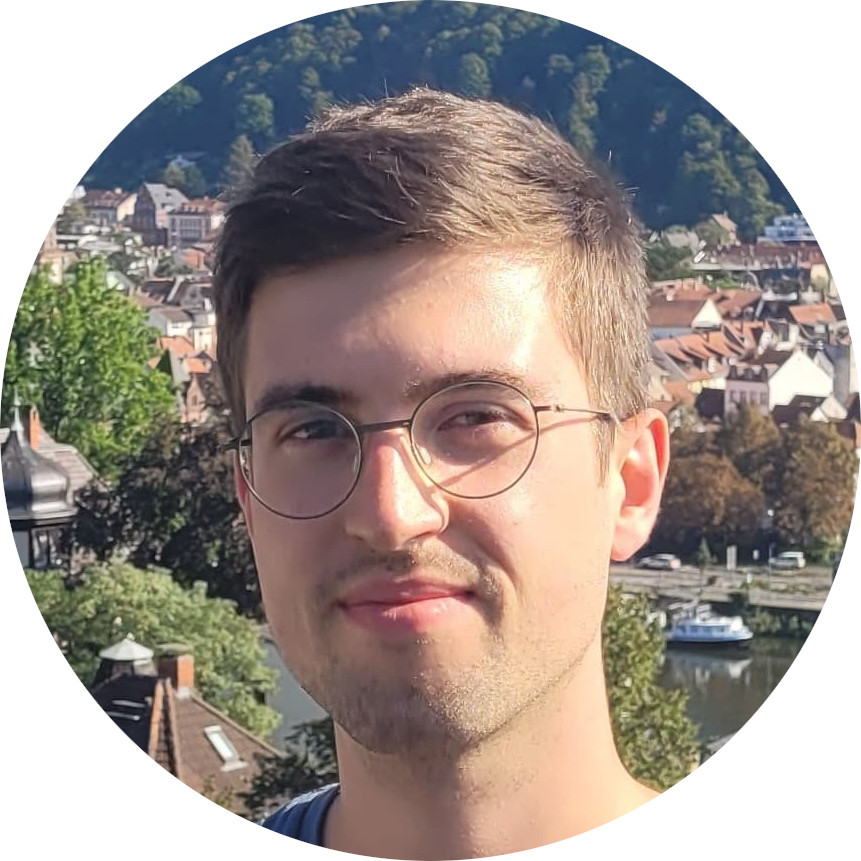
Theo Heimel
Postdoctoral researcher in particle physics and machine learning
About me
I am a postdoctoral researcher in particle physics and machine learning at the Centre for Cosmology, Particle Physics and Phenomenology in Louvain-la-Neuve. The main focus of my research is accelerating event generation for the High-Luminosity LHC and beyond using generative networks. In particular, the MadNIS project aims to make sampling hard-scattering events in MadGraph faster using neural importance sampling. Furthermore, I am interested in ML-based methods to extract more information from LHC data. This includes unfolding with generative networks, simulation-based inference, and combining machine-learned detector effects with theory knowledge in the matrix element method.
Career
Postdoc, 2024 –
Centre for Cosmology, Particle Physics and Phenomenology
UCLouvain
PhD in Physics, 2021 – 2024
Advisor: Tilman Plehn
Heidelberg University
MSc in Physics, 2018 – 2021
Advisor: Tilman Plehn
Heidelberg University
BSc in Physics, 2015 – 2018
Advisor: Tilman Plehn
Heidelberg University
Publications
Simulation-Prior Independent Neural Unfolding Procedure
A. Butter, T. Heimel, N. Huetsch, M. Kagan, T. Plehn
arXiv:2507.15084
Precision calibration of calorimeter signals in the ATLAS experiment using an uncertainty-aware neural network
G. Aad et al.
arXiv:2412.04370
Profile Likelihoods on ML-Steroids
T. Heimel, T. Plehn, N. Schmal
arXiv:2411.00942
Differentiable MadNIS-Lite
T. Heimel, O. Mattelaer, T. Plehn, R. Winterhalder
arXiv:2408.01486,
SciPost Phys. 18, 017 (2025)
The landscape of unfolding with machine learning
N. Huetsch, J. Villadamigo, A. Shmakov, S. Diefenbacher, V. Mikuni, T. Heimel et al.
arXiv:2404.18807,
SciPost Phys. 18, 070 (2025)
The MadNIS reloaded
T. Heimel, N. Huetsch, F. Maltoni, O. Mattelaer, T. Plehn, R. Winterhalder
arXiv:2311.01548,
SciPost Phys. 17, 023 (2024)
Precision-machine learning for the matrix element method
T. Heimel, N. Huetsch, R. Winterhalder, T. Plehn, A. Butter
arXiv:2310.07752,
SciPost Phys. 17, 129 (2024)
Returning CP-observables to the frames they belong
J. Ackerschott, R. Barman, D. Gonçalves, T. Heimel, T. Plehn
arXiv:2308.00027,
SciPost Phys. 17, 001 (2024)
How to understand limitations of generative networks
R. Das, L. Favaro, T. Heimel, C. Krause, T. Plehn, D. Shih
arXiv:2305.16774,
SciPost Phys. 16, 031 (2024)
MadNIS - Neural multi-channel importance sampling
T. Heimel, R. Winterhalder, A. Butter, J. Isaacson, C. Krause, F. Maltoni et al.
arXiv:2212.06172,
SciPost Phys. 15, 141 (2023)
Modern Machine Learning for LHC Physicists
T. Plehn, A. Butter, B. Dillon, T. Heimel, C. Krause, R. Winterhalder
arXiv:2211.01421
Two invertible networks for the matrix element method
A. Butter, T. Heimel, T. Martini, S. Peitzsch, T. Plehn
arXiv:2210.00019,
SciPost Phys. 15, 094 (2023)
Machine learning and LHC event generation
A. Butter et al.
arXiv:2203.07460,
SciPost Phys. 14, 079 (2023)
Generative networks for precision enthusiasts
A. Butter, T. Heimel, S. Hummerich, T. Krebs, T. Plehn, A. Rousselot et al.
arXiv:2110.13632,
SciPost Phys. 14, 078 (2023)
Measuring QCD Splittings with Invertible Networks
S. Bieringer, A. Butter, T. Heimel, S. Höche, U. Köthe, T. Plehn et al.
arXiv:2012.09873,
SciPost Phys. 10, 126 (2021)
QCD or What?
T. Heimel, G. Kasieczka, T. Plehn, J. Thompson
arXiv:1808.08979,
SciPost Phys. 6, 030 (2019)
Contact
theo.heimel@uclouvain.be
UCLouvain, CP3
Chemin du Cyclotron, 2 bte L07.01.05
1348 Louvain-la-Neuve
Belgium